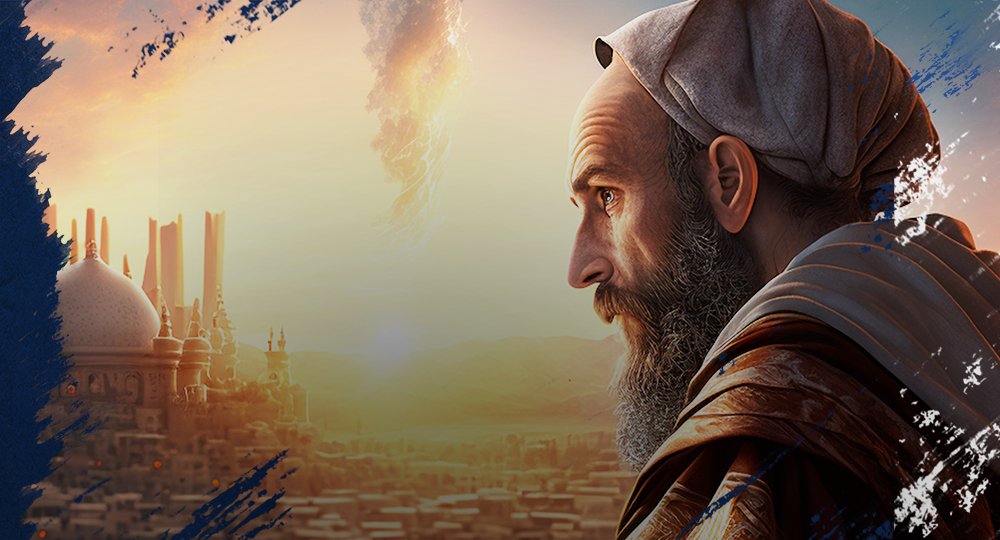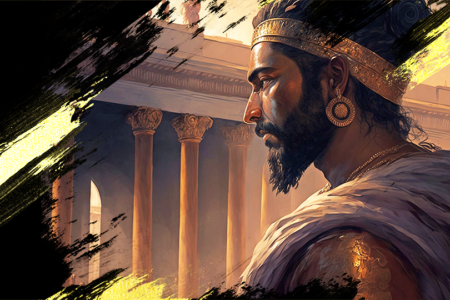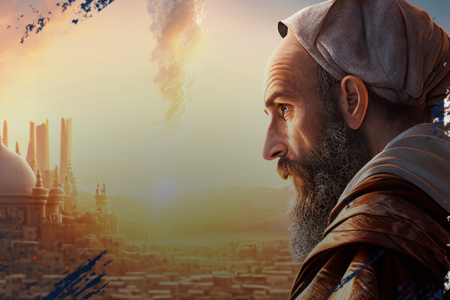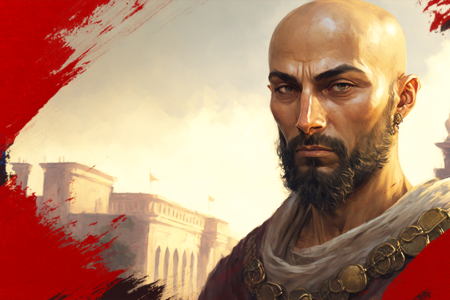Mordecai
He was a hero in the book of Esther. But, like most of us, he had another side as well.
Occasionally, my second son and I dabble in the hobby of polishing rocks. With lots of time and patience, rough-hewn stones placed into a rock tumbler come out colorful, smooth, and gleaming. It’s incredible to see how a stone that is ugly and jagged can be sanded down to look beautiful.
Unfortunately, we sometimes “polish” people in the Bible, seeing only their good qualities. While Scripture highlights Mordecai’s admirable traits, it shows us some rough edges too. And it’s those rough edges that communicate some vital aspects of the account in the book of Esther.
Mordecai’s Background
The upheaval of the Mesopotamian nations in the years of Israel’s exile saw the rise and fall of several empires that spanned the known world. The book of Esther is set after the fall of the Neo-Assyrian Empire to the Neo-Babylonian Empire in 612 BC and the fall of the Neo-Babylonian Empire to the Persian (Achaemenid) Empire in 539 BC, during the reign of Persian King Xerxes, called Ahasuerus.
Mordecai was an official in Ahasuerus’s court in the capital city of Shushan. It’s unclear how important his position was; but he clearly held influence because he sat in “the king’s gate,” where judges and other officials typically worked in ancient cities (2:19; 6:10, 12); and he had access to the portion of the palace that housed the king’s harem (2:11). A cuneiform tablet unearthed by archaeologists in the 1940s lists Mordecai as having a position in the city.1
In the language of the Persian Empire, the name Mordecai was a tribute to the Babylonian god Marduk. But in Hebrew, it is a combination of the words bitter and crushed, or oppressed, a fitting name for a man whose family was exiled from their home in Jerusalem and forced to assimilate into Babylonian life and culture. Mordecai’s father, Kish, a Benjamite, was carried into exile when the Babylonians captured Judean King Jehoiachin (Jeconiah) in 597 BC (v. 6).
However, when the decree from Cyrus the Great in 539 BC enabled the exiles to return to Jerusalem, Mordecai’s family remained in Persia.
Mordecai’s Character
There is much that shines about Mordecai’s character. He showed great compassion and graciousness in choosing to raise his young cousin, Hadassah, as his own daughter (v. 7). He also showed his dutiful faithfulness by revealing his coworkers’ assassination plot against Ahasuerus (vv. 19–23). And he shared God’s passion to protect His people, evidenced by his mourning in Esther 4 when he learned of Haman’s edict to annihilate the Jews.
When the tables were turned on Haman’s attempt to honor himself, and Mordecai was honored instead, the text shows Mordecai’s great humility. He immediately returned to his work at the gate, whereas Haman went home and pouted (6:12).
Perhaps the finest of Mordecai’s qualities was his complete trust in God’s sovereign plans and his certainty that God would protect His people Israel. Mordecai famously told Queen Esther in 4:14,
If you remain completely silent at this time, relief and deliverance will arise for the Jews from another place, but you and your father’s house will perish. Yet who knows whether you have come to the kingdom for such a time as this?
Mordecai trusted completely that God would orchestrate events to protect His people; there are no coincidences. Esther was divinely put in the right place at the right time to be God’s conduit to influence events on the world stage. And Mordecai rightly recognized the responsibility of God’s people to act in partnership with God’s plans.
Mordecai’s Troubling Behavior
After reviewing Mordecai’s good qualities, it seems appropriate to focus on some of his rough edges as well. Mordecai evidenced some troubling behavior; and though we cannot know his motives, we must recognize that God tells us these things for a purpose.
Why, for example, was Mordecai in Shushan at all? Cyrus’s decree that allowed the Jewish exiles to return to Jerusalem was issued 59 years earlier. Why did Mordecai not return to the land of his people? We’re left to wonder about the extent of his assimilation and whether he was too comfortable among the Gentiles. Instead of returning to Jerusalem, he took a position in the court of a king who was a notoriously ruthless, drunken sexual predator.
Similarly, when Ahasuerus ordered his men to collect young virgins for him, why didn’t Mordecai attempt to hide Hadassah or send her away? He knew exactly what type of abuse lay in her future, but Scripture records no resistance on his part. It appears he encouraged Hadassah’s prospects, even telling her to use the Persian name Esther and hide her ethnicity. We can’t help but ask, “Why would Mordecai choose this course of action?”
However, the most troubling of Mordecai’s activities involved what he did after Haman’s plan to kill the Jews was foiled and King Ahasuerus gave Esther and Mordecai the freedom to write a law to counteract Haman’s evil edict. Mordecai didn’t merely write a law allowing Jewish people to defend themselves against attack; he wrote one allowing the Jews to counterattack “both little children and women, and to plunder their possessions” (8:11).
The text says 800 men in the capital were killed and 75,000 throughout the empire (9:12, 15–16). Such retaliation goes far beyond simply protecting the Jewish people. We don’t know why he authorized such action; but it appears needlessly vindictive, opportunistic, and morally questionable. And the text indicates the extent of this new law lacked divine approval. Chapter 9 says three times the Jews did not plunder their enemies (vv. 10, 15–16).
In the midst of this ruthlessness, Mordecai was raised to the position of prime minister; and “the fear of Mordecai” (v. 3) fell on all the governors and royal officials, some even pretending to be Jewish because they were afraid (8:17).
Imperfect Partners
What are we to make of the unpolished, rough-hewn Mordecai? Ultimately, the judgment seems positive. He is described as a man who sought the welfare of Jewish people and spoke shalom (peace), rough edges and all (10:3).
Perhaps the best way to view his complicated character is through the lens of his statement in 4:14 that God will raise up partners to work His plans at the right time, whether or not the partners feel ready for their roles.
The overall message of the book of Esther is that God sovereignly works His plans through imperfect people. This is true of His preservation of the Jewish nation, and it is true on the world stage. Just as God used Mordecai to preserve His Chosen People, God used the wicked kings of Assyria, Babylon, and Persia to work His will, even exiling the Jewish people from their land.
The same holds true on the small stages of our lives. God uniquely places all of us in situations into which blows the breeze of His sovereign grace. We become the conduits through which He works, whether rough-hewn or highly polished.
What matters to God is our willingness and determination to submit to His will. Mordecai teaches us about God’s grace in choosing imperfect partners, like you and me, to live and work for Him wherever He plants us. Whether we feel ready or not, He has sovereignly placed all of us in a foreign land to live for Him and speak His peace “for such a time as this.”
ENDNOTE
-
- Koot Van Wyk, “Finding Mordechai at Persepolis,” academia.edu (tinyurl.com/2b2z8bwr).









I found this article to be very interesting and most thought provoking.
I am very keen to be learning about how as a Christian we can come along side Jewish people.And by receiving articles from FOI I am being blessed in my research.
Dorothy
This reinforces the issue of trying to make sense of situations in our lives using human logic (Isaiah 55:8, 1 Corinthians 2:14). We simply cannot. We must live by faith (Hebrews 11:6).
Excellent article. I love to read it. I am from India. But I love to read articles about Lord Jesus and Jews.
I’m reading Divine Providence originally in old English by Puritan Stephen Charnock but done in modern English. God has plans He does not need to tell us so that He will get all the glory. And He does in Esther.
I am a Jewish believer from an orthodox background. I know more about who I am than I ever learned in the shul.
Hello Debbie,
I was just wondering what you mean by “shul”. I’m a Gentile believer but I love Israel because they are God’s people. I too have learned more about Israel as a nation and people through FOI then anywhere else. Thanks
Hugh West